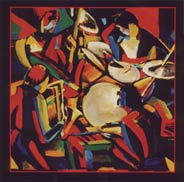Soft Machine
Live In Paris
(Cuneiform)
Of all the line-ups that can be filed under the (mysterious but ultimately
useful) "New English Jazz" label, Soft Machine are without a doubt
the group that's still remembered with more affection and warmth, especially
on the Continental part of Europe where at the time their music was met with
real enthusiasm - and tangible sales. And I'm quite sure that had Soft Machine
been an American group by now they would have received their due in the evolution
of the electric music, post-Davis.
Cognoscenti know quite well that the group's history is more than
a bit complicated, and they reserve a special spot for the album titled Volume
Two, quite influential on many groups - alas!, of the non-commercial kind.
Hence, outside the pages of most Encyclopedias.
Whether Soft Machine were still a good group after Robert Wyatt jumped
ship has always been the source of heated arguments. One could maybe distill
the discussion about Live In Paris - a double CD recorded live on May 2, 1972
which had previously been released with a different mastering - by asking
the reader whether s/he likes Soft Machine's Fifth; especially side two, which
presented the work of John Marshall, the same drummer featured on Live In
Paris.
This
factor is important for still another issue: for technical reasons, this recording
places the rhythm section as louder than the era's norm (we could jokingly
talk about a "Can mix"), so we get a loud set of drums; Elton Dean's
saxophones suffer a bit, while Mike Ratledge's organ solos are sometimes partially
masked by Dean's piano backing. Hugh Hopper's bass is always clear.
Though
it was destined to undergo further changes not too long after this concert,
the group never sounds tired or as playing by the numbers. This is quite easy
to see in the versions of those perennial classics - off the album Third -
titled Slightly All The Time, Out-Bloody-Rageous and Facelift. But it's when
playing the compositions off the still-new Fifth that the group sounds especially
involved, and very convincing. All White, Drop and Pigling Bland are very
good, but the peaks are to be found on the relaxed M.C. and the long As If.
There are also two improvisations: And Sevens, with two electric pianos (hope
I'm not wrong if I say that during this concert Dean plays more electric piano
than on most other live recordings of the group); and the closing track, At
Sixes, with the usual instrumentation.
Without
a doubt Marshall is a technically more accomplished drummer than Wyatt. But
whereas when Wyatt was in the group one had the impression that anything could
happen, Marshall's kind of geometry (listen to the high-hat - and notice how
different Hopper's work sounds for this) sometimes gives the impression of
narrower horizons.
Beppe Colli
© Beppe Colli 2004
CloudsandClocks.net | Sept. 5, 2004











